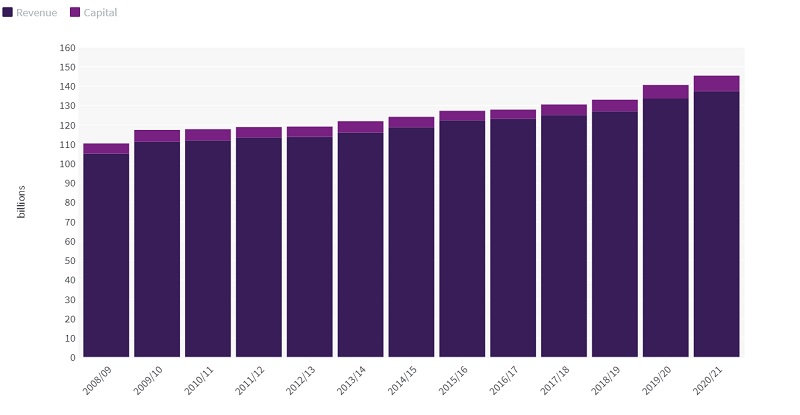- Extra £6bn of health funding over the next four years of this Parliament to create 50m more GP surgery appointments, ensure there are 50,000 more nurses, and to fund wider commitments on hospital car parking and support for people with learning disabilities and autism
- Figure includes £5.4bn of revenue funding for day-to-day operations
- In 2020/21 the Department of Health and Social Care’s capital spending limit will be increased by £683m to help refurbish and maintain the estate
- However, current backlog maintenance demands on the NHS estate already stand at £3.4bn
- Government has already announced £200m for the replacement of old diagnostic equipment and £100m in seed funding to develop proposals to build 40 new hospitals
- Budget constitutes a 3.4% increase in spending for 2020/21 compared to 2019/20 to £145.1bn
- Chancellor also announced a £640bn capital spending investment for roads, railways, communications, schools, hospitals, housing and power networks across the UK between now and 2024/25
The Chancellor has announced increased spending on the NHS over the next year, with an additional £5.4billion for the day-to-day running of services and an increase in the spending limit for capital projects.
But, with the Coronavirus outbreak, and the UK finally exercising its decision to leave the European Union, will Rishi Sunak’s first Budget in his new cabinet position go far enough to protect services?
Siva Anandaciva, chief analyst in the policy team at the King’s Fund health think tank, is sceptical, describing the Budget as ‘providing some pieces of the jigsaw, but not a complete picture’.
He adds: “Areas of spending that have not yet been protected – including parts of the wider health and social care budget – will surely come under tremendous pressure in the coming months as the Government tries to stay within its spending envelope and fiscal rules.
A Spending Review is a difficult task at the best of times. And, clearly, this is not the best of times
“A Spending Review is a difficult task at the best of times. And, clearly, this is not the best of times.
“Over the past few weeks officials have been framing this spring Budget as the first of a ‘trilogy’ of fiscal events in 2020 that included the coming Spending Review and the autumn Budget.
“But a Chancellor who used some striking rhetorical repetition to demonstrate his interest in ‘getting things done’ will also recognise two things: there is still plenty more to do, and, in any trilogy, the second act is usually the hardest to pull off.”
In his speech, Sunak announced an extra £6billion of health funding over the course of this parliament – though a detailed breakdown of annual spending has not yet been provided.

Chancellor, Rishi Sunak
However, the figures includes about £5.4billion of revenue spending over the remaining four years of this parliament.
This will support the Government’s manifesto commitments on more clinical staff, more GP surgery appointments, greater community-based care for people with learning disabilities or autism, and free hospital car parking for some patient groups.
Turning to capital investment in NHS buildings and equipment, there are several areas that will see increased spending, he said.
Firstly, in 2020/21, the Department of Health and Social Care’s capital spending limit will be increased by £683m to allow NHS trusts to refurbish and maintain their estate.
But, while this additional funding is welcome, said Anandaciva, with an estates backlog of high and significant risk issues that totals £3.4billion to date, the problems with the estate will be ‘salved rather than solved’.
It’s unclear whether the industry has the workforce for all the upcoming infrastructure projects and the new immigration system creates more uncertainty
There is also the previously-announced £200m (£100m in 2019/20 and £100m in 2020/21) for replacing old diagnostic equipment such as MRI, CT scanners and breast screening equipment to help the NHS achieve its target of faster diagnosis of cancer; and about £50m to support research into coronavirus and wider prevention.
Finally, there is £100m of seed funding in 2020/21 to help the NHS develop proposals to build 40 new hospitals.
Anandaciva said: “All of this leaves the total Department of Health and Social Care budget slightly higher in 2019/20 and 2020/21 than was planned before the spring Budget, with health spending now expected to increase by 3.4% to £145.1billion in 2020/21.”

The King's Fund has analysed spending by the Department of Health and Social Care. 'Revenue' refers to day-to-day spending (eg staff salaries). 'Capital' refers to investment in, for example, buildings and equipment
This capital investment is part of a wider government strategy to kickstart large construction projects, with the Chancellor announcing £640billion of gross capital spending investment for roads, railways, communications, schools, hospitals, housing and power networks across the UK by 2024-25.
A detailed breakdown of this commitment will be provided in the National Infrastructure Strategy, which the Chancellor said will be published later in the spring.
Commenting on this boost for the building industry, Brendan Sharkey, head of construction and real estate at MHA MacIntyre Hudson, said the Chancellor had succeeded in spreading new work around the country, but warned that a lack of skilled workers could thwart the plans.
He added: “Without question the Budget is good news for construction overall; the measures to develop infrastructure, particularly new roads, flood defences and broadband will complement existing investment to ensure companies have enough work.
“But the cloud on the horizon is labour.
“It’s unclear whether the industry has the workforce for all the upcoming infrastructure projects and the new immigration system creates more uncertainty.
It is time for the Government to be bolder in using the full range of its taxation and regulation powers to help meet its own manifesto commitment to extend healthy life expectancy by five years by 2035
“Notably the Chancellor did not announce reliefs or grants for capital investment, which would have been one obvious way to mitigate the labour issue.”
And Clive Docwra, managing director of construction consulting and design agency, McBains, told BBH: “The construction industry will applaud the commitment to spend over £600billion on infrastructure over the next five years, although we wait to see the further detail of these plans.
“In particular, we would have liked to see the Chancellor go further than announcing a £400m brownfield fund to support the development of new homes: a review of the greenbelt would have been a bolder step.”
But he welcomed that the Chancellor’s announcement that firms with fewer than 250 members of staff would have sick pay payments refunded if workers had to take time off to self isolate during the coronavirus outbreak.
“Coronavirus threatens to seriously impact the construction industry if workers have to self isolate, so the commitment will help many small construction companies, as will the assistance for those who need a deferral period on their tax liabilities to see them through any instability,” he said.
Elsewhere, the Budget announcement touched on the grossly-underfunded social care and public health sectors.
On public health, Anandaciva said: “If the runes on the workforce are confusing to read, they are even more confusing for public health.
“The new financial year starts in two weeks and directors of public health can only take an educated guess at how much money they will be able to spend on services that help people stop smoking, tackle the spread of sexually-transmitted diseases, and provide guidance and advice to lead healthier lives.
“This uncertainty could not come at a worse time for the NHS and voluntary and community services providers who rely on these contracts.
“It is time for the Government to be bolder in using the full range of its taxation and regulation powers to help meet its own manifesto commitment to extend healthy life expectancy by five years by 2035.
After a sprint to the line to get the Budget finished, officials must now prepare themselves for one of the most-difficult Spending Reviews in recent memory
“But the opportunity was not taken in this Budget, and in time we will see if freezing every single alcohol duty for only the second time in 20 years really justified the cheers it garnered from government benches.”
However, once again, adult social care was hardly touched upon.
Anandaciva said: “When it comes to fiscal events, adult social care is an exception to the rule ‘no news is good news’.
“Once again, a government has decided that the much-needed reform of adult social care financing is a ‘big issue’ that must be ‘tackled head on’. But not today.”
In the interim, however, local authorities have some welcome news.
There is £643m of funding for accommodation to help people who sleep rough, and to boost support and treatment services for people with multiple complex needs such as homelessness, reoffending, and substance misuse.
And there are two sources of financial support for social care to deal with the impact of coronavirus.
First, money should flow to them from the new £5billion emergency response fund. And, second, as many social care providers are small and medium-sized businesses, they will also benefit from the refunded Statutory Sick Pay and other proposals aimed at businesses employing fewer than 250 staff.
But, beyond this, local authorities will receive no extra funding in 2020/21 over and above what was provided in the 2019 Spending Round, even as costs continue to increase.

Siva Anandaciva
“The Chancellor used the Budget to propose ambitious increases to the National Living Minimum Wage that would see it rise to two-thirds of median earnings if economic conditions allow,” said Anandaciva.
“This will be welcome for hard-working staff in the care sector, but will also represent an unfunded cost pressure for cash-strapped local authorities.”
He concludes: “Some uncertainty lingers after a Budget that provided some more pieces of the jigsaw, but not a complete picture.
“The Government has certainly acted to mitigate the financial impact of coronavirus on the health and care sector. It has provided funding to back up its manifesto commitments, and it has addressed the pensions tax issue.
“But next year’s budgets for important areas of spending – including public health spending – are undefined with just two weeks left before 2020/21 begins.
“Hopes of social care funding reform must be deferred once again; and a Budget heavy on infrastructure spending left the NHS none the wiser on what capital investment will look like beyond the coming year.
“Moving to the longer term, after a sprint to the line to get the Budget finished, officials must now prepare themselves for one of the most-difficult Spending Reviews in recent memory.
“Some of the rules of the game have been set – the Spending Review will be completed by the end of summer and will set day-to-day spending budgets for government departments up to 2023/24 and capital budgets up to 2024/25.
“But this Spending Review will be conducted during a coronavirus pandemic and without detailed forecasts of how this outbreak will impact the public finances.”
For more on the impact of the Budget on efforts to contain the coronavirus outbreak, click here.




